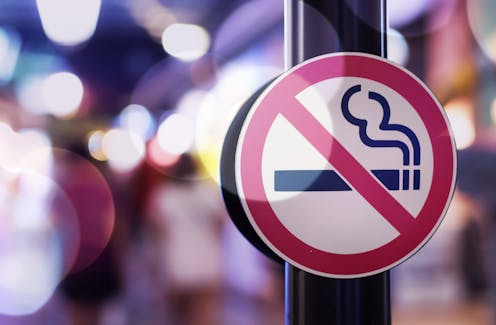New Zealand is introducing law to create a smokefree generation. Here are 6 reasons to support this policy
- Written by Janet Hoek, Professor of Public Health, University of Otago

Imagine a society where tobacco does not kill nearly 5000 people every year[1] in New Zealand, and more than eight million worldwide[2].
The New Zealand government’s new legislation, which had its first reading in parliament today, aims to create a smokefree nation by introducing a unique measure to protect young people from the many harms smoking causes.
Smoking eventually kills two thirds of people who smoke long-term, which means tobacco companies face a stark choice. They can either continue to recruit new users or go out of the smoked-tobacco business. To date, they have chosen the former option.
By positioning smoking as a sophisticated adult behaviour and designing youth-oriented brands[3], tobacco companies have lured many thousands of young people[4] into a lifelong addiction that most came to regret.
Governments elsewhere have narrowed the pipeline of replacement smokers by increasing the purchase age of tobacco, which is now an R21 product in some jurisdictions[5].
But Aotearoa plans to adopt a different approach with the Smokefree Environments and Regulated Products (Smoked Tobacco) Amendment Bill[6], which will introduce a smokefree generation[7].
Read more: Smoking age: here's what effect raising it to 21 could have in England[8]
The bill proposes disallowing the sale of tobacco products to people born in 2009 or later. Over time, this measure would create a smokefree cohort – a group of young people protected from smoking.
In combination with other proposed policies – reducing the nicotine content in tobacco products and far fewer retail outlets selling tobacco – the smokefree generation would see tobacco use virtually end.
But why move from extending age restrictions to creating a smokefree generation? Here are six key reasons.
A measure to protect freedoms
The vast majority of people who smoke come to regret it[9] and say they would not smoke if they could live their lives again.
The smokefree generation addresses the burden addiction places on people. It puts in place age-appropriate restrictions, in the same way the government restricts other risky activities, such as drink driving.
However, unlike drink driving, tobacco products cause the premature death[10] of two thirds of the people who smoke long-term. These risks greatly outweigh any potential perceived “benefits” at all ages.
A smokefree generation is a proportionate response to managing a highly dangerous product.
Smoking is not an ‘informed choice’
Tobacco companies have conveniently forgotten how strenuously they once denied the harms smoking causes[11]. They now acknowledge[12] the health risks associated with tobacco.
This stance enables them to claim smoking is an “informed choice” and thus blame people who smoke for harms they experience later. The smokefree generation challenges this rhetoric[13] and recognises nobody can willingly embark on a lifelong addiction before they understand and accept the price it will extract.
Right to protection from lethal products
Although tobacco companies have done their best to position smoking as a socially accepted practice[14] and tobacco as a normal consumer product, no other product kills its users when consumed exactly as intended.
The smokefree generation recognises people’s right to protection from a uniquely harmful product and addresses the historical anomalies that have allowed tobacco to be sold.
Age restrictions do not provide sufficient protection
Age-restriction policies mean that, as each year passes, some young people “graduate” beyond the age limit, which may inadvertently frame smoking as a rite of passage.
The smokefree generation challenges misperceptions of smoking as a coming-of-age ritual and makes it clear there is never a safe age to start smoking. By clearly signalling that smoking is always harmful, it offers much greater protection than age-restriction measures.
Read more: Tobacco killed 500,000 Americans in 2020 – is it time to control cigarette-makers?[15]
Reducing inequities caused by smoking
Modelling studies[16] estimate the smokefree-generation policy could halve smoking prevalence within 14 years among people aged 45 and younger.
Importantly, it is predicted to achieve a more than five-fold health gain to Māori, compared to non-Māori. These estimates mean the smokefree generation will help address disparities in smoking prevalence and reduce the health inequities they cause.
The public is ready to bring an end to smoking
Surveys have reported very strong support for the bill’s approach. A New Zealand survey[17] of people who smoke or had recently quit found more than three quarters supported this policy.
Support for a smokefree generation was about 10% higher than for increasing the legal purchase age for tobacco from 18 to 21. Support among the general population is likely to be higher still, making the smokefree generation an overwhelmingly popular policy.
The policy will protect young people’s freedoms and safeguard their future wellbeing by removing access to a product engineered to addict them as quickly as possible. By framing smoking as socially unacceptable and preventing youth sales over time, the smokefree generation will help ensure smoking prevalence can never rise again.
References
- ^ 5000 people every year (www.health.govt.nz)
- ^ eight million worldwide (www.who.int)
- ^ designing youth-oriented brands (www.tobaccofreekids.org)
- ^ lured many thousands of young people (www.who.int)
- ^ jurisdictions (www.fda.gov)
- ^ Smokefree Environments and Regulated Products (Smoked Tobacco) Amendment Bill (legislation.govt.nz)
- ^ smokefree generation (pubmed.ncbi.nlm.nih.gov)
- ^ Smoking age: here's what effect raising it to 21 could have in England (theconversation.com)
- ^ come to regret it (pubmed.ncbi.nlm.nih.gov)
- ^ cause the premature death (pubmed.ncbi.nlm.nih.gov)
- ^ denied the harms smoking causes (news.stanford.edu)
- ^ acknowledge (www.batnz.com)
- ^ rhetoric (pubmed.ncbi.nlm.nih.gov)
- ^ position smoking as a socially accepted practice (pubmed.ncbi.nlm.nih.gov)
- ^ Tobacco killed 500,000 Americans in 2020 – is it time to control cigarette-makers? (theconversation.com)
- ^ Modelling studies (pubmed.ncbi.nlm.nih.gov)
- ^ New Zealand survey (itcproject.s3.amazonaws.com)
















